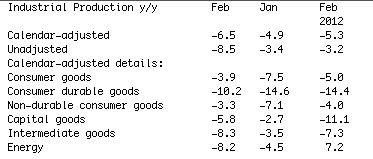 Spanish industrial production dives again - The economic crisis in Spain continues. Data released this morning showed that industrial production in the country tumbled by 6.5% in February, compared with a year ago.
Spanish industrial production dives again - The economic crisis in Spain continues. Data released this morning showed that industrial production in the country tumbled by 6.5% in February, compared with a year ago.
That's the 18th monthly contraction in a row.
The slump was driven by a double-digit decline in production of durable goods for consumers, who are suffering badly as Madrid implements its austerity programme.
But production was also down across the board, from other consumer goods to large-scale industrial equipment:

Many Spanish factories have closed since the financial crisis struck, creating a vicious circle of rising unemployment and falling demand.
One example, thousands of people were employed at a door factory in the town in Villacanas, south of Madrid. In the good days they churned out products for Spain's property boom - but the plant is now closed, along with most of of the Villacanas industrial park....
The picture is slightly better in France this morning, where industrial production only fell by 2.8% year-on-year in February, and actually picked up by 0.7% compared with January.
I'll be tracking the reaction to today's data, and watching developments across the eurozone -- particularly Slovenia (whose PM yesterday rejected speculation that a bailout would be needed), and Cyprus (where time is running out to agree its bailout).

5 comments:
EC warns Spain and Slovenia are too imbalanced
Spain and Slovenia's economies are both worryingly imbalanced, the European Commission has warned in its official report into macroeconomic imbalances in the EU.
Both countries were picked out as having "excessive' imbalances.
Spain, the EC said, still suffers from "very high domestic and external debt levels continue to pose serious risks for growth and financial stability."
For Slovenia, it risks financial sector instability because of "corporate indebtedness and deleveraging". The EC also pointed to the close links with public finances -- a nod to the face that most Slovenian banks are state-owned.
You can download the full report here.
Another 11 countries still show macroeconomic imbalances (just not as excessive as Spain and Slovenia). This excludes Greece, Ireland, Portugal and Cyprus - all now in bailout programmes.
EC warns France over pace of reforms
The EC has also warned France that it needs to go further to reform its economy.
Today's report on macroeconomic imbalances points to France's poor growth and rising debt levels. The EC fears that the eurozone's second-largest economy poses risks to the rest of the region.
The report says:
France’s public sector indebtedness represents a vulnerability, not only for the country itself, but also for the euro area as a whole.
So while Francois Hollande is refusing to slow down (see 11.51am), the EC wants him to move faster....
Time to wrap up for the day. Here's a closing summary.
• The scale of the financial troubles in Cyprus have been laid out by an official debt sustainability assessment. It predicts that its GDP will tumble this year, and not start growing until 2015 (see 4.20pm onwards).
• Cyprus will also sell around €400bn of its gold reserves (see 4.12pm).
• There was embarrassment at the Federal Reserve after it was forced to publish the minutes of its last meeting 5 hours early. The minutes show that one member of its monetary policy committee wanted to start slowing its QE programme now (see 2pm onwards)
• The Fed has launched an inquiry, admitting that it accidentally sent the minutes out yesterday (see 2.44pm)
• Christine Lagarde has claimed tonight that the global economy is a little less dangerous than six months ago. She warned, though, that global growth in 2013 will be little better than 2012 (see 5.30pm)
• The European Commission has warned that Spain and Slovenia's economies are significantly imbalanced. Another 11 countries also contain worrying imbalances, including France - who was urged to make more rapid and deeper reforms (see 12.17pm onwards).
• Spanish industrial output data showed that its manufacturing base endured another dire month in February, shrinking by 6.5%. Italy also suffered a fall in industrial production. See 8.43am onwards.
Speaking in New York ahead of next week’s IMF Spring meeting, Ms Lagarde launched a broadside against the financial services industry for resisting urgent reform.
“In too many cases – from the United States in 2008 to Cyprus today – we have seen what happens when a banking sector chooses the quick buck over the lasting benefit, backing a business model that ultimately destabilizes the economy. We simply cannot have pre-crisis banking in a post-crisis world.
“We need reform, even in the face of intense pushback from an industry sometimes reluctant to abandon lucrative lines of business.”
Almost five years since Lehman Brothers collapsed, she claimed: “The 'oversize banking’ model of too-big-to-fail is more dangerous than ever. We must get to the root of the problem with comprehensive and clear regulation.”
Regulators have forced banks to increase significantly their loss-absorbing capital buffers since the crisis, but are still working on "resolution" mechanisms that will allow giant lenders to fail without hitting the taxpayer and threatening financial stability.
You can just tell from all these people talking today (her, Rehn, etc.) there's a 5hitstorm coming over the horizon and I have no doubt the taxpayers - and probably the bank deposit account holders (I reckon Cyprus was just a 'test' to see if they could get away with doing it to those holding under 100k) in Europe (and the UK) will end up footing the bill.
No doubt whatsoever.
I lost my shirt on my Cyprus bank account as you can tell.
Post a Comment